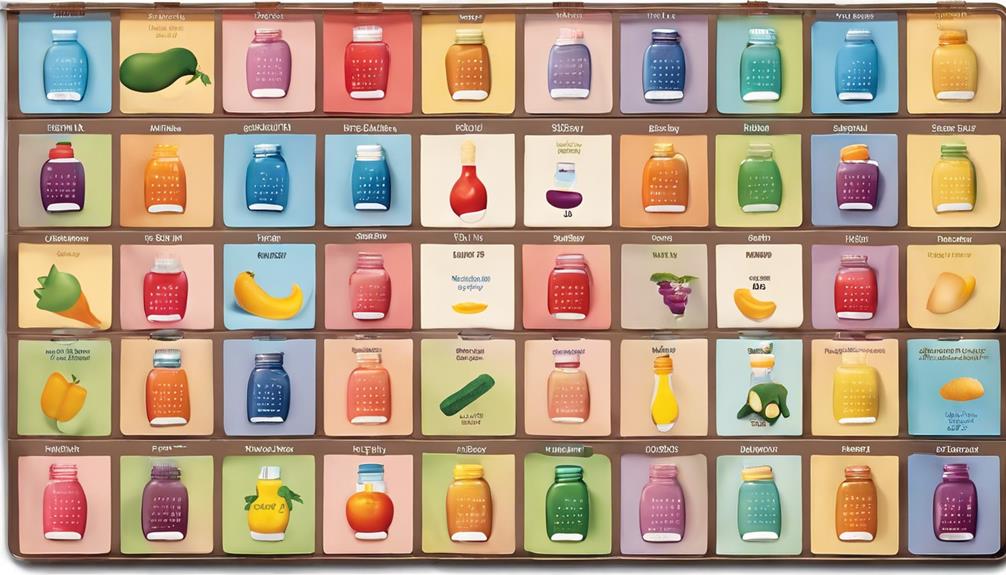Designing a feeding schedule for a 7-month-old that incorporates both solid foods and formula is like trying to solve a puzzle with pieces that won’t stay put.
As we navigate this balancing act, ensuring our little ones get the right mix of nutrients becomes a top priority. But how do we strike that perfect equilibrium between introducing new foods and maintaining a familiar routine?
Let's explore some practical tips and strategies to navigate this important phase of our baby's development.
Key Takeaways
- Introduce iron-rich solid foods like cereals and pureed meats for essential nutrients.
- Offer 6-8 ounce bottles of formula alongside solid foods to maintain a balanced diet.
- Increase solid food quantity and variety gradually to support growth and development.
- Consult healthcare professionals for guidance on adjusting the feeding schedule as the baby grows.
Importance of a Balanced Feeding Schedule
Establishing a balanced feeding schedule for your 7-month-old is essential for providing the necessary nutrients for their growth and development. At seven months old, your baby is ready to explore new flavors and textures beyond breast milk or formula. Introducing solid foods rich in iron and zinc can be beneficial for their overall health. By incorporating a mix of solid foods and infant formula into their diet, you make sure they receive a variety of nutrients vital for their development.
Carefully planned feeding schedules not only help in maintaining their energy levels throughout the day but also support their growing nutritional needs. Consistency in feeding times can aid in regulating their appetite and establishing a healthy eating routine. Additionally, balancing milk feeds with solid foods is essential in preventing deficiencies and promoting healthy weight gain in their first year.
When introducing new solid foods, be mindful of potential food allergies and monitor their reactions closely. A well-crafted feeding schedule at this stage sets the foundation for good eating habits and guarantees your little one receives the essential nutrients they need for the best growth and development.
Transitioning to Solid Foods

As we continue to nourish our 7-month-old, let's now explore the progression to solid foods, a pivotal step in broadening their culinary palate and meeting their expanding nutritional requirements.
Introducing solids around 6 months of age is vital, especially iron-rich options like iron-fortified cereals, pureed meats, or beans, which support growth and development. Offering a variety of single-ingredient purees helps identify potential food allergies or sensitivities, with one new food introduced every few days. Progressing the texture from purees to mashed or soft chunks aids in developing chewing skills and moving smoothly to solid foods.
Ensuring a balance of protein, carbohydrates, fruits, and vegetables in your baby's meals is essential for providing necessary nutrients and fostering healthy eating habits early on. Consulting with your pediatrician is advisable if you have concerns about readiness for solids or need guidance on creating a suitable feeding schedule that incorporates both formula and solids. Remember, every baby is different, so personalized advice from a healthcare professional can be invaluable in this exciting feeding journey.
Incorporating Formula Into the Schedule
To guarantee a well-rounded diet for your 7-month-old, incorporating formula into their feeding schedule is essential for providing essential nutrients like iron and zinc necessary for their growth and development. When integrating formula feedings into your baby's routine, here are some key points to take into account:
- Offer 6 to 8 ounce bottles of formula every 5 to 6 hours to make sure your baby receives an adequate amount of nutrients throughout the day.
- It's important to provide formula alongside solid foods to help maintain a balanced diet and meet your baby's increasing nutritional needs.
- Adjust the frequency of formula feedings based on your baby's cues and appetite to make certain they're getting the appropriate amount of nutrition for their growth and development.
Consulting with your pediatrician can also help determine the right amount of formula to incorporate into your baby's daily feeding schedule, making certain they receive the necessary nutrients for healthy development.
Sample 7-Month-Old Feeding Schedule

When incorporating formula into a 7-month-old's feeding schedule, it's important to guarantee a balanced intake of nutrients by following a structured plan that includes both milk feedings and solid foods. A sample feeding schedule for a 7-month-old baby might include 24-32 ounces of breast milk or formula per day, alongside the introduction of solid foods 2-3 times daily. Formula-fed infants usually consume 6-8 ounce bottles 3-5 times a day, while breastfed babies nurse 3-5 times. Gradually introducing foods from major food groups such as fruits, vegetables, grains, proteins, and dairy can help provide a balanced diet for your little one. Structured feeding schedules not only support your baby's nutritional needs but also aid in achieving developmental milestones. Below is a visual representation of a basic 7-month-old feeding schedule:
| Time | Activity |
|---|---|
| 7:00 am | Breast Milk/Formula |
| 9:30 am | Baby Food |
| 12:00 pm | Breast Milk/Formula |
| 3:00 pm | Baby Food |
| 6:00 pm | Breast Milk/Formula |
| 8:00 pm | Baby Food |
Adjusting the Schedule as Baby Grows
Upon reaching the 7-month mark, caregivers should gradually incorporate more solid foods into the baby's feeding schedule while ensuring a continued intake of breast milk or formula for balanced nutrition. As our little one grows, we must adapt their feeding routine to meet their changing needs. Here are some essential adjustments to contemplate:
- Increasing the Amount: Start increasing the quantity of solid foods offered at each meal to help your baby feel satisfied and support their growth.
- Introducing New Solid Foods: Explore a variety of new solid foods to introduce different flavors and textures to your baby's palate.
- Ensuring a Balanced Diet: Offer foods from all food groups to guarantee your baby receives a wide range of nutrients necessary for their development.
It's vital to monitor your baby's response to these changes, adjusting the schedule based on their cues and appetite. Consulting with a healthcare professional can provide valuable guidance on optimizing your baby's feeding routine as they continue to grow and thrive.
Frequently Asked Questions
How Can I Tell if My 7-Month-Old Is Ready to Start Solids?
We can tell if our 7-month-old is ready for solids by observing signs like sitting with support, showing interest in food, and losing the tongue-thrust reflex. Consulting our pediatrician for guidance is essential.
What Are Some Signs That My Baby May Not Be Tolerating a Certain Type of Solid Food Well?
Sometimes, we notice our little ones not reacting well to certain solid foods. Watch for signs like rashes, stomach discomfort, or changes in bowel movements. Keeping a food diary can help pinpoint triggers and guide adjustments.
Can I Mix Formula With Solid Foods for My 7-Month-Old?
Yes, we can mix formula with solid foods for our 7-month-old. Ensuring the consistency is appropriate for their stage of development is crucial. This method can help introduce new flavors and textures while providing necessary nutrients.
Are There Any Specific Foods That I Should Avoid Giving to My 7-Month-Old?
Oh, we've learned that at 7 months, steering clear of honey, whole nuts, cow's milk, and choking hazards like grapes and popcorn is key. Safety first, right? Let's keep those little ones thriving!
How Can I Ensure My Baby Is Getting Enough Nutrients With a Balanced Feeding Schedule?
We focus on balancing nutrients in our baby's diet by offering a variety of foods rich in vitamins, minerals, proteins, and healthy fats. Regularly consulting with our pediatrician guarantees we meet our baby's unique nutritional needs.
Conclusion
To start, crafting a well-rounded feeding schedule for your 7-month-old with a mix of solids and formula is essential for their growth and development.
Are you prepared to start this thrilling journey of introducing new flavors and textures to your little one's diet?
Remember to consult with your pediatrician for personalized guidance and make adjustments as your baby grows and their needs change.
Here's to happy and healthy feeding times ahead!









